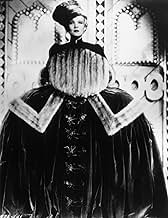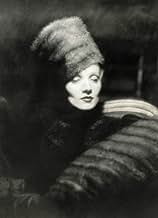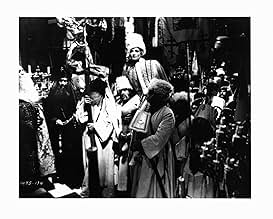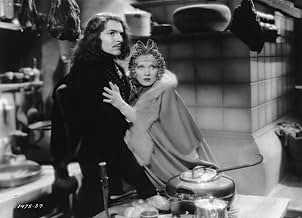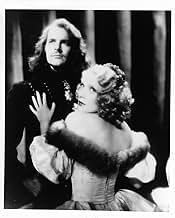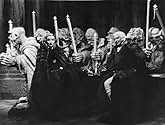A German noblewoman enters into a loveless marriage with the dim-witted, unstable heir to the Russian throne, then plots to oust him from power.A German noblewoman enters into a loveless marriage with the dim-witted, unstable heir to the Russian throne, then plots to oust him from power.A German noblewoman enters into a loveless marriage with the dim-witted, unstable heir to the Russian throne, then plots to oust him from power.
- Count Lestoq
- (as Phillip Sleeman)
- Ivan Shuvolov
- (as Hans von Twardowski)
- Sophia as a Child
- (as Maria)
- Lackey #5
- (uncredited)
- Count von Breummer
- (uncredited)
- Sophia's Aunt
- (uncredited)
- Director
- Writers
- All cast & crew
- Production, box office & more at IMDbPro
Storyline
Did you know
- TriviaMarlene Dietrich's own daughter Maria Riva portrayed young Sophia at the beginning of the film and it was her debut in movies.
- GoofsMost of the action takes place at The Kremlin in Moscow. The historical Empress Elizabeth, Grand Duke Peter and later Catherine spent most of their reigns in St. Petersburg, which during the 18th Century was a modern, Europeanized city.
- Quotes
Grand Duke Peter: Why are those bells ringing?
[He opens the bedroom door and addresses a man in the hall]
Grand Duke Peter: Why are those bells ringing?
Capt. Gregori Orloff: I don't know, Peter.
Grand Duke Peter: How dare you address me like that! Who are you?
Capt. Gregori Orloff: My name is Orloff, and I'm on duty as guard.
Grand Duke Peter: I'll have your head for this insolence! You're addressing the emperor!
Capt. Gregori Orloff: There is no emperor. There is only an empress.
- ConnectionsEdited from The Patriot (1928)
- SoundtracksSymphony No.4 in F Minor, Op.36
Written by Pyotr Ilyich Tchaikovsky
Excerpts played during the opening credits and incorporated into the score often
The whole of the Russian court turns out to be not much different from the vile stories of atrocity she was narrated to as a child, one after another a series of machinations at the hands of the half-mad.
But of course history was never the purpose for Sternberg, these stories at the beginning of the film he visualizes in the manner of pages from a book. So a fiction malformed from history, a book of images, ostensibly based on the diaries of the real person, in turn a history malformed from the real thing, with Dietrich stage center, shining, radiant.
It was always Dietrich that validated film for Sternberg, the image of seductive beauty that could seduce beauty from the camera. But in several ways, I feel that Sternberg deteriorated upon joining up with her much like the hapless professor in Blue Angel. His art was tortured before, anguished with emotion, but since Dietrich it seemed to be solely consumed by her at the expense of all else.
Nowhere is this more evident than here, no pretense about it anymore. Dietrich is quite literally queen, destined to be, and the whole thing around her merely provides the tortured circumstances for the scene of triumph.
There is so much cacophony when she does finally triumph that it makes you think Sternberg has finally gone unhinged from so much pained adoration, that he doesn't quite know when to separate one feverish fantasy from his own. A cavalcade storms inside the palace and up the expansive staircase, a bell rings, ringing bells across the country, crowds rejoice, that were earlier silently praying, and Dietrich is finally ushered on shoulders into the church swarmed with banners on all sides to be crowned empress. Ride of the Valkyries clangs away in bombast for the duration.
But this is the thing that strikes the most vividly, the crowning luxurious decadence of the whole enterprise. Even in the grip of what seems like lovestruck paroxysm, Sternberg could envision farther than most at the time. And when he failed, he failed more spectacularly than anyone could, in the most interesting ways to see.
It baffles. It exhilarates with the sheer monstrosity of the caricature. It overwhelms any sensibility that is fine, any sense of good taste. You will never see more a outrageous depiction of an Orthodox church ever, the frescoes of saints bordering on a surreal that is blasphemous. Or more styrofoam gargoyles in one studio lot palace.
So the frame is overflowing with anguished, fiendish luxury; but everything that is grossly portrayed here, was actually taking place on that studio lot. Whatever was going on in 18th century Russia, at least this thing was actually happening in Hollywood, that would go to such lengths to envision and stage such a dazzling darkness. A cavalcade was made to storm up a staircase. And there was this woman at the center, flickering before the camera like the flame of the candle she holds at one scene, finally lighting up the place.
So it is apt to recast the whole thing as Dietrich's journey, mirrored from the other, from her faraway home into the court of a foreign country, with every spotlight on her, every male pair of eyes.
The first part is sourced out as a kind of Alice in Wonderland; the girl enters a strange world, apprehensive, fearful, a world that would reduce her to size, where she must fit through doors too big, wait for the queen or lose her head, finally descend into a rabbit hole and come out the other end the mother of a heir.
But in the second part she becomes the Dietrich we know and have come to see conquer with fierce beauty, the Lola that first broke hearts in Blue Angel; the whole film around her transforms into the restless dream that men were dreaming about her. The idea is that she becomes that dream, operating the image from inside.
It is not a good film all else considered, the overcooked bombast, the intertitles that never shy away from revealing the full implications of the most obvious detail, but it's a mess you should see, just for how madly passionate.
- chaos-rampant
- Dec 14, 2011
- Permalink
- How long is The Scarlet Empress?Powered by Alexa
Details
Box office
- Budget
- $900,000 (estimated)
- Gross worldwide
- $3,353
- Runtime1 hour 44 minutes
- Color
- Aspect ratio
- 1.37 : 1
Contribute to this page



